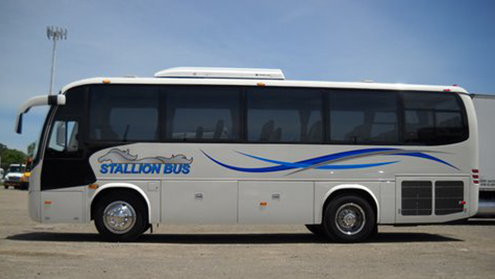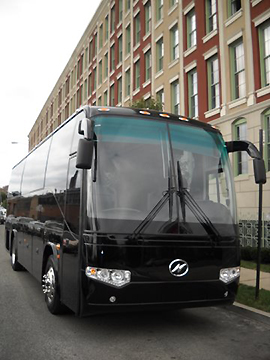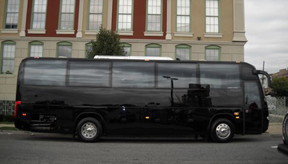
The road ahead includes new models for niche markets
By David Hubbard

Stallion Bus and Transit, Melville, NY, is celebrating its sixth year in the North American bus and coach industry and says it is continuing to push forward with its innovative approach.
Vice President Mike Rosato says the company launched in 2006 with a plan for a mid-size coach it believed filled a void in the rear engine midsize market. Stallion Bus entered as the newbie at half the price.
“We knew the motorcoach market was both price sensitive and quality conscious,” he says. “It seemed simple enough, given the fact that every motorcoach operator knows and understands the operational characteristic of every vehicle in the fleet — the suspension, the engine and transmission, each component and accessory, as well as the cost involved to operate each coach. Convincing the U.S. motorcoach industry is a whole other challenge.”
Rosato says the Stallion product can carry 40 passengers, or two-thirds of an operator’s current capacity, for about half of what it costs to buy and insure a standard 45-ft coach. It also uses less fuel and has a lower maintenance cost per mile.
“Stallion Bus went the extra mile and subjected its new coach to the 12-year, 500,000 Altoona Test,” he says. “The published results clearly demonstrate its quality. In addition, we offered through Freightliner a five-year, 200,000-mile warranty. We do this because we want operators to feel safe and secure with a Stallion Bus product they can trust will last and work at a price that makes it all come together to fit into their fleet.”
Rosato attributes the success of Stallion Bus to its strong product line and warranty program. He says the California plant was situated in the middle of the market where the company could interact easily with customers. He says at this time the company was able to provide an update model every quarter.
“Luck was on our side and our timing couldn’t have been any better,” says Rosato. “We caught the market right before the economic decline and had a chance to deliver quite a few coaches in 2007 and 2008. However, in 2009 most motorcoach operators saw a decline in ridership presumably from the weak economy.”
Rosato responded to what he says he kept hearing from operators about suddenly having to transport smaller groups of 30 to 40 passengers, and that their customers specifically did not want to charter a 55-passenger coach for trips of this size. They were concerned about costs, the waste of fuel and also their customers would become scattered throughout a cavernous coach and lose the special intimacy of a small group.
What the new Stallion 40-passenger vehicle offered, according to Rosato, was coach styling with the ride, look and feel of a big motorcoach.
“So while 2009 was a slower year than 2008 we continued to see an uptick in the demand for our coach of this size,” he says. “This continued right through 2011.”
Rosato credits the reliability of the Stallion coach and a service record he finds impeccable to the Freightliner chassis by Freightliner Custom Chassis Corporation in Gaffney, SC.
“Our coaches run day in and day out with very few, if any, issues,” he says. “The Freightliner chassis turned out to be the most reliable chassis we could have gone with. FCCC has 650 service centers nationwide, which means 650 places where an operator can buy parts. Cummins engine and Allison diesel service centers also support the product.”
Rosato says he appreciates the wide range of drivetrains FCCC makes available.
“If our customer is climbing hills we have a 330HP,” he says. “If he is in Manhattan then the 280HP meets his needs.”
In 2008, Stallion introduced its 30-ft rear engine 800 model with a Freightliner chassis to carry 30 passengers. It follows the same construction guidelines and has the same look and feel as the large motorcoach with a similar ride.

“Stallion owners often remark about the maneuverability of either length coach in tight quarters,” says Rosato. “We have

positioned these smaller coaches not as a replacement for a 45-foot motorcoach but rather as complementary vehicle within the fleet. We do think that in the under-$300,000 price range the customer gets more coach for the money.”
Stallion buses incorporate Thermo King rooftop AC, an entertainment system with USB/iPod, GPS and satellite radio and high back seats and a bode-style door.
Stallion can install Wi-Fi, satellite TV, and 110 outlets with any order. Rosato sees this as one of the advantages of having assembly plants in the U.S. The company operates two such facilities, one on California for the 800 Series and one in Elkhart, IN.
Rosato says the plan for Stallion through 2012 and beyond is continued focus on its two current models and to introduce new products based on both low-floor designs and electric chassis for niche markets. BR
